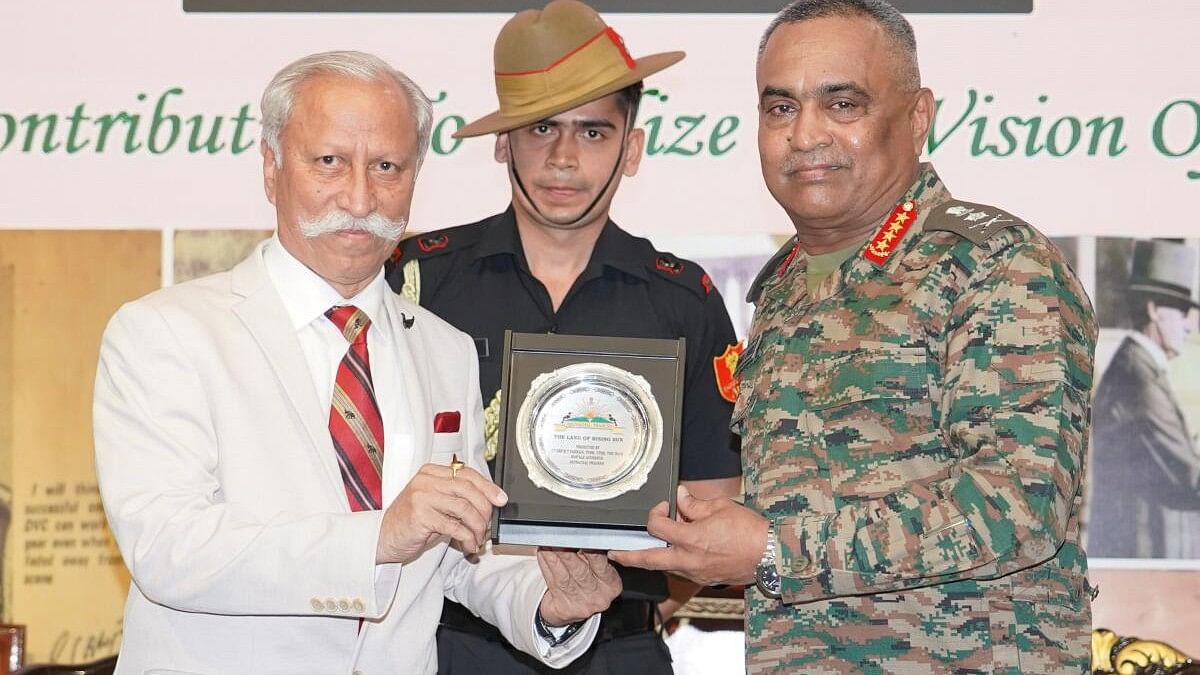
Arunachal Pradesh Governor K.T. Parnaik(L) and Chief of the Army Staff General Manoj Pande(R) during the 2nd 'Lieutenant General PS Bhagat Memorial Lecture', at Manekshaw Centre, in New Delhi.
Credit: PTI photo
New Delhi: With India's interests growing across expanding strategic horizons, it is essential for the armed forces to be 'alive to our responsibility', not only in the security domain, but also towards contributing to the nation's growth, Army Chief Gen Manoj Pande said on Friday.
In his address at the second Lt Gen P S Bhagat Memorial Lecture hosted at Manekshaw Centre here, he described the legendary officer, who was a recipient of the Victoria Cross, as a visionary who was ahead of his times.
"In the book -- The Shield and The Sword -- written after the 1965 war, Gen Bhagat had crystal-gazed on the appreciated Chinese strategy against India. He had also written a paper, The Chinese Mind: What will China do next? His prognosis of our northern adversary, seven decades ago, stands vindicated today," the Army chief said.
Lt Gen Bhagat was the first Indian officer to have won the coveted Victoria Cross during the World War II. Bhagat was born in October 1918, and was decorated with the Victoria Cross by the then Viceroy of India Lord Linlithgow in 1941.
The Victoria Cross, instituted by the British, is the highest decoration for valour, awarded for extreme bravery in the face of the enemy.
In his address, Gen Pande said, the nation today is 'charting a remarkable journey' of progress and development, with rising aspirations of its citizens.
"While the mandate and role of the armed forces to ensure that the nation's security is not impacted in any way so that its progress continues unabated, is paramount, the expectations from the armed forces to contribute to India's growth story shall only increase in the future," he said.
"As the nation's interests span across expanding strategic horizons, it is essential for us to be alive to our responsibility, not only in the security domain, but also towards contributing to the nation's growth," Gen Pande added.
Hence the subject of the talk - Armed Forces Contribution to Realise the Vision of a Rising India -- is relevant and apt, the Army chief said.
"The holistic transformation of the Indian Army that we put into effect two years ago is part of our efforts to give shape to a modern, agile, adaptive, technology enabled and self-reliant future-ready force," he said.
The Army chief said the transformation roadmap stands on the edifice of five pillars, which are force restructuring and optimisation; modernisation and technology infusion; improving systems, processes and functions; human resource management; and jointness and integration.
Lt Gen Bhagat, being a progressive thinker and futurist, had penned down the essence of transformation, almost seven decades ago, as part of his insightful strategic writings in the three books - Forging the Shield, The Shield and the Sword and Wielding of Authority in Emerging Countries, he said.
The key pointers in this context that Lt Gen Bhagat flagged are, firstly, the need for organisations to adapt as conditions change. Secondly, while referring to the importance of 'material armament', he stressed on resource optimisation in terms of men and inventory, to meet military commitments of the nation, the Army chief added.
He (Lt Gen Bhagat) also has written on 'theatre commands', emphasising on an inclusive role of other Services. Besides his writings, he exemplified the fundamental aspects of human resource management, evident in his penchant for high training threshold, administrative excellence and welfare of his command, Gen Pande said.
"In order to give effect to transformative changes, similar to what Gen Bhagat envisioned in his times, we intend to not only change and vigorously pursue ongoing transformation initiatives, but to change at a good pace too, so that we remain ready, relevant and resurgent," he said.
Governor of Arunachal Pradesh, Lt Gen (retd) K T Parnaik, delivered the keynote speech to the audience that consisted of a few former Army chiefs, senior army officers, and Ashali Varma, daughter of Lt Gen Bhagat.